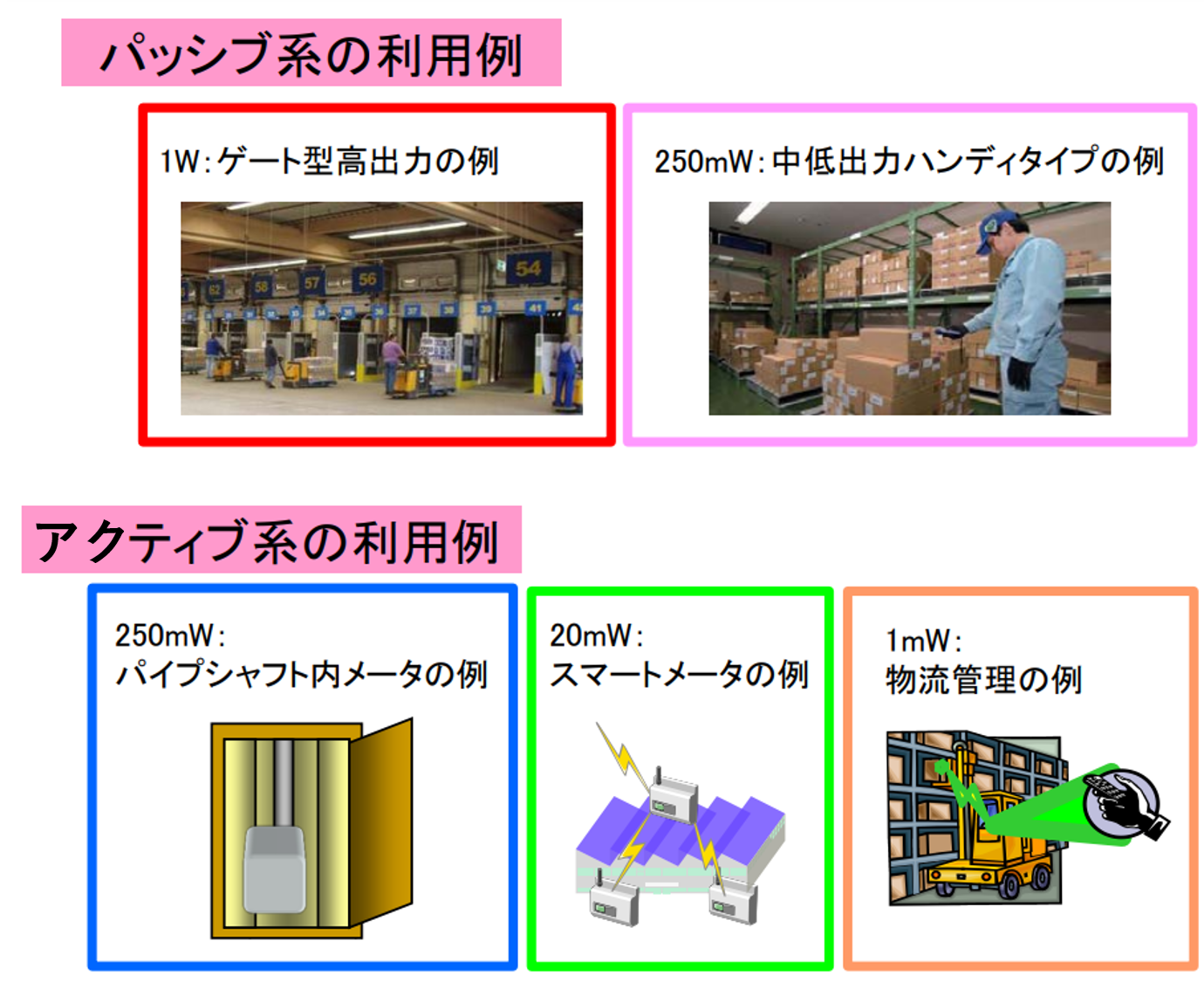Radio law certification (technically required) is also required for RFID, which has become a hot topic recently, and it may be necessary to apply to the Ministry of Internal Affairs and Communications as a high frequency utilization facility
この記事は約 18 分で読めます。 1,340 Views
Hello. It is a hori of the manager.
This time, I would like to take up RFID, which has become a hot topic in recent years as a tool to dramatically improve productivity by automating inventory management, inventory, sales information, etc. at logistics and retail sites.
For definitions of RFID, please refer to Wikipedia below.
RFID (radio frequency identifier) refers to rf tags embedded with ID information, wireless communication at close range (several cm to several meters depending on frequency band) using electromagnetic fields and radio waves, and technologies in general. Conventional RF tags are composed of circuit boards with multiple electronic elements, but in recent years they have become possible to realize them with small one-chip ICs (integrated circuits). (omission)
Contactless IC cards also use the same technology as RFID and are included in a broad RFID type. Contactless IC cards can be used for various purposes such as ride cards, electronic money, and authentication such as employee ID cards and security locks. In Japan, the FeliCa standard is dominant.
In the narrow sense, wireless communication technology between tags and leader is talked about, but as a technical field, it is talked about including the entire operation system in which tags are attached to various objects and people and their position and movement are grasped in real time.
Quote: Wikipedia_RFID
The convenience and future possibilities of RFID have become a hot topic in many media, and there are many pages that are explained in detail, so basically I would like to hand it over to that, and on this page, I would like to write mainly on points to note regarding radio law authentication of RFID.
Contents
- 1 Although RFID is convenient, the frequency is strong (high frequency utilization equipment), so in addition to applying for the Radio Law, it may be necessary to apply to the Ministry of Internal Affairs and Communications (Minister of Internal Affairs and Communications).
- 2 Specified low-power products that do not require application to the Ministry of Internal Affairs and Communications
- 3 Criteria classified as specified low power
- 4 In fact, active type, passive type that operators do not understand much
- 5 It is important for business operators to understand Japan's radio law system to some extent
Although RFID is convenient, the frequency is strong (high frequency utilization equipment), so in addition to applying for the Radio Law, it may be necessary to apply to the Ministry of Internal Affairs and Communications (Minister of Internal Affairs and Communications).
First of all, what are high-frequency utilization facilities?
The definition is quoted from the homepage of the Ministry of Internal Affairs and Communications.
High-frequency utilization equipment is widely used in the fields of medical care, industry, etc. using telegraphs, telephones, and other communication facilities that pass high-frequency currents of 10 kHz or more to electric railway lines, and high-frequency currents of 10 kHz or more, and contributes greatly to Japanese industry. However, since radio waves leaking from high-frequency usage equipment may interfere with other wireless communications, those who intend to install high-frequency utilization equipment that uses a certain frequency or power must obtain permission before installation.
In addition, procedures are required when changing the equipment that has been granted (expansion, removal, change of installation location, etc.), when trying to abolish it, or when handing over.
High-frequency utilization facilities are roughly classified as "communication facilities" and "facilities other than communication facilities".
Citation: Ministry of Internal Affairs and Communications homepage_What is high frequency use equipment?
It is not necessary to remember that it is too difficult, but in short, it is necessary to define products that emit strong radio waves among products that contribute to the convenience of our lives as "high-frequency utilization equipment", and report their sales or installation to the Ministry of Internal Affairs and Communications (Minister of Internal Affairs and Communications).
In addition to the notification of high-frequency usage equipment, some require radio law certification, so please check carefully what kind of notification will occur in the product you are trying to handle.
By the way, as classified high frequency utilization equipment,
Ultrasonic cleaners, ultrasonic processing machines, ultrasonic welders, electrodeless discharge lamps, conveyed intercoms, electromagnetic induction heating type copier printing machines, special conveyance digital transmission equipment, induction reading and writing communication equipment (RFID), non-contact power transmission equipment (wireless power transmission equipment (WPT)), broadband power line conveyance communication equipment (PLC), electromagnetic induction heating cooker, industrial heating equipment, Other facilities
And so on.
Specified low-power products that do not require application to the Ministry of Internal Affairs and Communications
When applying for RFID as a high-frequency utilization facility to the Ministry of Internal Affairs and Communications, it is necessary to divide it into "on-site radio station" mainly intended for indoor use and "land mobile station" mainly for outdoor use.
In addition, the document procedure etc. do not cost much, and it is not so difficult if you do what you do, but there is the biggest disadvantage that it simply takes time to apply for acceptance.
If you want to know more about this area, please see this page of the Ministry of Internal Affairs and Communications.
Ministry of Internal Affairs and Communications homepage_ Application for RFID (individual identification by radio wave)
On the other hand, from here on, the main story of this story,
In the case of "specified low power" with a small amount of power used in RFID, notification to the Ministry of Internal Affairs and Communications is unnecessary, and there is a system that is OK only by authentication according to the Radio Act.
If you do not understand here, even though it is actually an RFID of "specific low power", it will be useless labor if you report to the Ministry of Internal Affairs and Communications without knowing it, and by having extra communication with the person in charge of the Ministry of Internal Affairs and Communications, please be careful because it will greatly lose business time.
Criteria classified as specified low power
In more detail, RFID is roughly divided into two types: passive and active.
In addition, the "aerial power" in the table below is the power capacity used. If this is a certain level or less, it is referred to as "specific low power (radio station)".

In fact, active type, passive type that operators do not understand much
First, let's look at the definition of passive and active types.
Searches for RFID passive active, etc. will hit various pages, but this page will use materials from the Ministry of Internal Affairs and Communications.
Passive
Passive tags cannot spontaneously fire radio waves, and the transmission energy of the electronic tag is only the power of the carrier from the reader / writer (Some have batteries and the like to supply power to the internal circuit of the electronic tag, the attached sensor, and the like. ) and does not provide any other power.Active type
Radio waves can be spontaneously fired by energy from the built-in power supply and the like. As a network system, it is being used for meter control in the field of electricity and gas, and is widely used as data transmission. It can be used up to 250mW and has a low output of 20mW or less, and a license is not required. It is considered that the utilization outside the house will increase dramatically by the application of dsss system and the development of beamforming antenna.
Let's also look at the examples of its use.

Citation: Ministry of Internal Affairs and Communications
Simply put, I think it is good to recognize that it is a passive type to hold directly (in a close position) to the product, and that holding it over at a certain distance is an active type.
There are product-specific problems such as electronic tag problems with RFID, but I will not discuss that on this page. Please refer to it as a page about authentication to the last.
Regarding certifications such as whether the product is passive or active, how to proceed with radio law certification related to it, and whether or not there is an application from the Ministry of Internal Affairs and Communications, I think that there is no problem if you check with a certification agency such as our company.
However, if you do not know that RFID is divided into passive type and active type in the first place, it will be a little difficult to proceed, so I think that you can learn that point in advance.
It is important for business operators to understand Japan's radio law system to some extent
It is roughly the Chinese factory that makes RFID product machines, and when certifying radio law, it is common to use a Chinese inspection engine as it is.
The problem at that time is that only in Japan, "specified low power" products do not need to be notified to the Ministry of Internal Affairs and Communications, and conversely, notification is required to the Ministry of Internal Affairs and Communications except for "specified low power".
As an overseas inspection organization or certification body, whether it is an active type or a passive type, there is no problem if it matches the frequency band of Japan, so there may be a description of active passive in inspection reports, etc., and a description of the power used.
Of course, we think in accordance with Japanese law, so we have seen a draft of an inspection report submitted by an inspection agency and told them to append the model and the power used.
Otherwise, even if the radio law-certified RFID does not have a material to be judged as "specified low power", and even if it is really "specified low power", there is no basis to prove it, so when selling and installing it as it is, there is a possibility that it will be subject to thrust from the Ministry of Internal Affairs and Communications and customers.
In light of this situation, we would like business operators to understand the radio law system to some extent, and if necessary, please consult with us.

